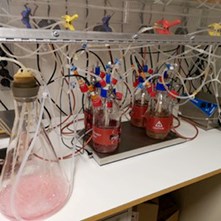Facts:
- Funding: Stockholm University and SLU
- Funding period: 2019-2022

In this project a model system for studying horizontal gene transfer in anaerobic microbial communities will be developed to study the emergence of antibiotic resistance genes.
Antibiotic resistant bacteria present a serious health problem worldwide with an increase in incidence during the last decade due to multiple factors like misuse and overuse by humans. Bacteria interacts with the environment, as well as with other type of bacteria since they live in multi-species communities. Bacterial interspecies relationships are central for the evolution and spread of antibiotic resistance genes, e.g. though plasmid-mediated lateral gene transfer. Such transfer of genes can speed up the emergence and dispersion of new resistance strains, also often responsible for multi-drug resistance phenotypes.
This project will study how promiscuous these plasmids can be when present in multi-species communities that are exposed to antibiotics. Additionally, bacteria that play an important role in the emergence of resistant phenotypes in naturally complex community settings will be identified. To this end, bioreactors will be established, with continuous flow operating under anaerobic conditions to maintain poly-species bacterial communities where donors carrying conjugative plasmids are added. Plasmids will then be tracked and how this treatment affect the structure of the microbial community composition will be studied.
The project is part of a PhD project to broadly study microbial evolution in natural and artificial settings.